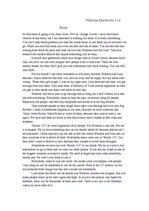
Big Brothers are no longer a joke but strut the world.īut the greatest horror in Orwell’s dystopia is the systematic stripping of meaning out of language. They share the need to crush opposition, a fanatical terror of dissent and self-promotion. And everywhere you look in the contemporary world, ‘strong’ men are in positions of power. Today there is another set of ‘-isms’, such as nationalism and populism who operate through the mobilisation of that most dangerous of feelings, resentment. He witnessed first-hand the self-deception of true believers. He fought against Fascism as a volunteer in the Spanish Civil War (believing pacifism was a luxury paid for by other people) but realised the hollow promise of Communism, when the anti-Stalinist group he was fighting for was hunted down by the pro-Stalin faction. Orwell’s writing is rooted in the struggles between the giant ‘-isms’ that disfigured the 20th Century. Then there is Orwell’s iconic dictator Big Brother: absurd and horrifying in equal measure. Modelled on consumer choices, where the user is the commodity that is being marketed, the harvesting of those preferences for political campaigns is now distorting democracy.

Today it is social media that collects every gesture, purchase, comment we make online, and feeds an omniscient presence in our lives that can predict our every preference. In 1984 television screens watch you, and everyone spies on everyone else. He and his fellow workers are controlled as a mass collective by the all-seeing and all-knowing presence of Big Brother. Winston Smith, the protagonist, works as a censor in the Ministry of Truth in a constant updating of history to suit present circumstances and shifting alliances. The book, with its disorientating first sentence, “It was a bright cold day in April, and the clocks were striking thirteen”, defines the peculiar characteristics of modern tyranny. Why The Handmaid’s Tale is so relevant today A n ancient poem that still sums up war

A book published on 8 June 1949, written out of the battered landscape of total war, in a nation hungry, tired and grey, feels more relevant than ever before, because Orwell’s 1984 also arms us. But stirring, moving, creative, undeniable and helpful? Yes. But now we can read 1984 differently: with anxious apprehension, using it to measure where we, our nations and the world have got to on the road map to a hell Orwell described.


 0 kommentar(er)
0 kommentar(er)
